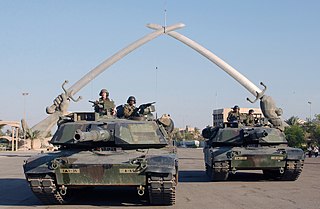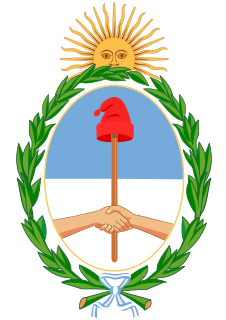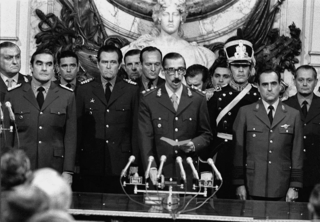Related Research Articles

The President of Argentina, officially known as the President of the Argentine Nation, is both head of state and head of government of Argentina. Under the national Constitution, the President is also the chief executive of the federal government and Commander-in-Chief of the armed forces.

Néstor Carlos Kirchner Jr. was an Argentine politician who served as President of Argentina from 2003 to 2007 and as Governor of Santa Cruz from 1991 to 2003. Ideologically a Peronist and social democrat, he served as President of the Justicialist Party from 2008 to 2010, with his political approach being characterised as Kirchnerism.

Raúl Ricardo Alfonsín Foulkes was an Argentine lawyer and statesman who served as the President of Argentina from 10 December 1983 to 8 July 1989. Alfonsín was the first democratically elected president after more than seven years of military dictatorship and is considered the "father of modern democracy in Argentina". Born in Chascomús, Buenos Aires Province, he began his studies of law at the National University of La Plata and was a graduate of the University of Buenos Aires. He was affiliated with the Radical Civic Union (UCR), joining the faction of Ricardo Balbín after the party split.

Arturo Frondizi Ercoli was an Argentine politician and lawyer who was President of Argentina from 1 May 1958 until 29 March 1962, for the Intransigent Radical Civic Union, which he led until 1986.

The Chamber of Deputies is the lower house of the Argentine National Congress. It is made up of 257 national deputies who are elected in multi-member constituencies corresponding with the territories of the 23 provinces of Argentina by party list proportional representation. Elections to the Chamber are held every two years; half of its members are renewed each election.

Military or belligerent occupation is effective provisional control by a certain ruling power over a territory, which is not under the formal sovereignty of that entity, without the violation of the actual sovereign. The territory is then known as the occupied territory and the ruling power the occupant. Occupation is distinguished from annexation by its intended temporary nature, by its military nature, and by citizenship rights of the controlling power not being conferred upon the subjugated population.

The Congress of the Argentine Nation is the legislative branch of the government of Argentina. Its composition is bicameral, constituted by a 72-seat Senate and a 257-seat Chamber of Deputies. The Senate, whose members are elected to six-year terms, consists of three representatives from each province and the federal capital. The Chamber of Deputies, whose members are elected to four-year terms, is apportioned according to population.

The Legal system of Argentina is a Civil law legal system. The pillar of the Civil system is the Constitution of Argentina (1853).

The Constitution of Argentina is the basic governing document of Argentina, and the primary source of existing law in Argentina. Its first version was written in 1853 by a Constitutional Assembly gathered in Santa Fe, and the doctrinal basis was taken in part from the United States Constitution. It was then reformed in 1860, 1866, 1898, 1949, 1957, and the current version is the reformed text of 1994.

The Supreme Court of Argentina is the highest court of law of the Argentine Republic. It was inaugurated on 15 January 1863. However, during much of the 20th century, the Court and the Argentine judicial system in general, has lacked autonomy from the executive power. The Court has recently been reformed by the decree 222/03.
Televisión Pública Argentina is a publicly owned Argentine television network, the national public broadcaster. It began broadcasting in 1951, when LR3 Radio Belgrano Television channel 7 in Buenos Aires, its key station and the first television station in the country, signed on the air.

Scouts de Argentina is one of the national Scouting associations of Argentina. Scouting was officially founded in Argentina in 1912, shortly after the publication of "Scouting For Boys" in Spanish, which was granted a National Charter in 1917, and was among the charter members of the World Organization of the Scout Movement in 1922. Scouts de Argentina has 42,812 members as of 2011.

The Assembly of Year XIII was a meeting called by the Second Triumvirate governing the young republic of the United Provinces of the Río de la Plata on October 1812.

The Argentine Constitution of 1853 is the current constitution of Argentina approved by provincial governments except Buenos Aires Province, who remained separate from the Argentine Confederation until 1859. After several modifications to the original constitution and the return of power to Buenos Aires' Unitarian Party, it was sanctioned in May 1853 by the Constitutional Convention gathered in Santa Fe, and was promulgated by the provisional Director of the national executive government Justo José de Urquiza, a member of the Federals Party. Following the short-lived constitutions of 1819 and 1826, it was the third constitution in the history of the country.

Attribution, in copyright law, is acknowledgement as credit to the copyright holder or author of a work. If a work is under copyright, there is a long tradition of the author requiring attribution while directly quoting portions of work created by that author.

The 1976 Argentine coup d'état was a right-wing coup that overthrew Isabel Perón as President of Argentina on 24 March 1976. A military junta was installed to replace her; this was headed by Lieutenant General Jorge Rafael Videla, Admiral Emilio Eduardo Massera and Brigadier-General Orlando Ramón Agosti. The political process initiated on 24 March 1976, took the official name of "National Reorganization Process", and the junta, although not with its original members, remained in power until the return to the democratic process on December 10, 1983.
The history of Argentina can be divided into four main parts: the pre-Columbian time or early history, the colonial period (1530–1810), the period of nation-building (1810-1880), and the history of modern Argentina.

The Chief of the Cabinet of Ministers, oficially known as the Chief of the Cabinet of Ministers of the Argentine Nation is a political office of Argentina, akin to a prime minister, created by the 1994 amendment of the Argentine Constitution. The current office holder is Santiago Cafiero, who serves in President Alberto Fernandez's cabinet.

In Argentina, about 10% of the electricity comes from 3 operational nuclear reactors: The Embalse Nuclear Power Station, a CANDU reactor, and the Atucha 1 plant in 1974, a PHWR German design. In 2001, the plant was modified to burn Slightly Enriched Uranium, making it the first PHWR reactor to burn that fuel worldwide. Atucha originally was planned to be a complex with various reactors. Atucha 2 began to produce energy on June 3, 2014, is expected to produce 745MWh. Plans for Atucha III, a third reactor in the Atucha complex, have been announced.
Transgender rights in Argentina have been lauded by many as some of the world's most progressive. The country "has one of the world's most comprehensive transgender rights laws": its Gender Identity Law, passed in 2012, made Argentina the "only country that allows people to change their gender identities without facing barriers such as hormone therapy, surgery or psychiatric diagnosis that labels them as having an abnormality". In 2015, the World Health Organization cited Argentina as an exemplary country for providing transgender rights. Leading transgender activists include Lohana Berkins, Diana Sacayán, Mariela Muñoz, María Belén Correa, Marlene Wayar, Claudia Pía Baudracco, Susy Shock and Lara Bertolini.
References
- ↑ ¿Qué son los superpoderes? (in Spanish)